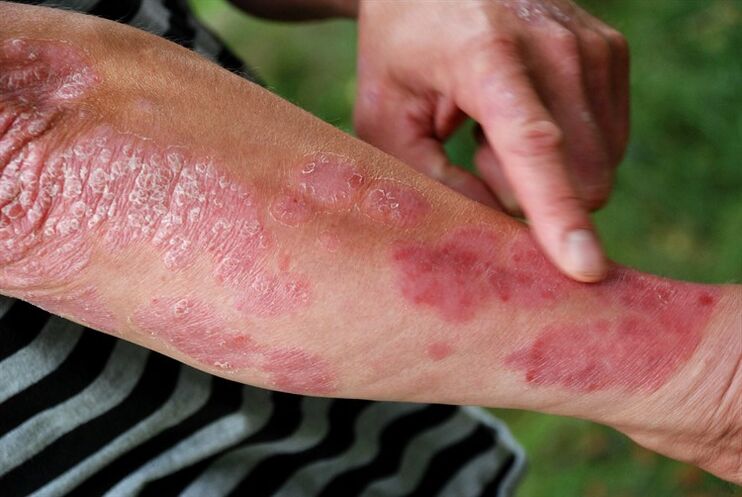Psoriasis is a common skin disease. Its name comes from the Greek word "psora" (translated as "itching"). Today, about 5% of the world's population suffers from this disease.
Psoriasis can occur in people of all ages, from infants to the elderly. Practice shows that most patients are young. They go to the doctor with suspicion of psoriasis.
Before visiting the clinic, you should know which specialist to contact with such complaints.
Which doctor should I contact if I suspect psoriasis?

In case of the first signs of psoriasis, it is necessary to visit a dermatologist. After all, the symptoms of this disease first appear on the skin.
A specialist who performs competent treatment of skin diseases will make the correct diagnosis, as well as perform all the necessary therapeutic measures.
If the patient has a complicated type of psoriasis (psoriatic arthropathy), treatment should be performed by a professional rheumatologist.
Regardless of which specialist the patient is referred to, the doctor can easily confirm or, conversely, rule out the presence of this disease.
Treating any form of psoriasis is a laborious process. By the way, a complete cure does not happen in principle. Even with the disappearance of symptoms, the disease passes into the regression phase. In this case, the symptoms may disappear completely.
Which doctor treats psoriasis?
Psoriasis is a systemic disease, the symptoms of which are not limited to skin rash. Often, its course is accompanied by a change in metabolism, immune disorders, as well as malfunctions in the endocrine system.

Violations often affect the work of internal organs. Therefore, consulting a dermatologist in this case is not enough.
Psoriatic plaques in many patients form on the scalp. In this case, the advice of a relevant specialist is required.
Dermatologist
It is very important that a patient with psoriasis be monitored regularly by an experienced dermatologist. This is very important, as this disease can worsen even a few years after remission.
In addition, the specialist performs the necessary studies to determine the underlying disease, which may have caused the development of a skin disease.
In this case, it is necessary to carry out its effective treatment.
All therapeutic measures, regardless of the severity of the disease, should be agreed with a dermatologist. Sometimes psoriasis provokes the development of a pathology that affects the joints - psoriatic arthropathy. In case of any complications, the specialist refers the patient to the rheumatologist.
Specialized doctors
When answering a common question, which specialist treats psoriasis, many people forget that it is important to eliminate not only the external manifestations of the disease, but also the cause that caused the deterioration of well-being. Therefore, for the effective treatment of the disease, it can not be done without the help of highly specialized specialists.

Below are the doctors who treat psoriasis and its common complications:
- gastroenterologist: the help of this doctor is required in cases of severe organ damage. In this case, it is often necessary to take powerful medications. Although they negatively affect the condition, the work of the stomach, liver, the course of treatment with the use of these drugs gives a good effect;
- cardiologist: pathology may be associated with significant disturbances in the work of the heart (pericardium, myocardium). In such cases, the patient simply needs professional help from a cardiologist;
- nephrologist:certain forms of the disease are associated with major failures, partial dysfunction of the bladder, kidneys. Treatment of such pathologies should be performed by a qualified physician;
- neurologist:Neurological pathologies often provoke a relapse of a skin disease. Therefore, patients prone to developing prostatitis (or when it recurs) should undergo a preventive examination every 3-6 months;
- rheumatologist: in case of arthropathy it is necessary to consult a rheumatologist. It is impossible to get rid of the disease without a properly chosen principle of treatment.
Treatment of pathology is effective only with timely action. Adherence to the doctor's recommendations will allow you to deal with mental distress as well as rule out the development of complications in the future.
All patients suffering from psoriasis are recommended to be observed by a psychologist. More than 78% of disease exacerbations are manifested due to nervous tension, severe stress.
An experienced psychologist will help any patient cope with emotional stress. Thanks to this, it will be possible to fit in much better in society.
Clarification of the diagnosis: what medical examinations should you undergo?

During the initial diagnostic examination, if psoriasis is suspected, the patient should undergo the following mandatory tests during the initial examination:
- Urine analysis: necessary to determine the water-salt balance;
- fecal analysis:required to detect the possible presence of helminths in the body;
- Blood test: general as well as biochemistry. Many patients mistakenly believe that blood helps to disprove or confirm the diagnosis. However, this is not entirely true. Such a study is performed to identify possible complications that are caused by the disease. Blood also allows you to determine the presence of allergic reactions in the body.
Additional studies include:
- bacteriological culture: performed if redness appears on the mucosa. This is necessary to rule out pharyngitis (acute);
- radiography: if the patient has joint pain, and the doctor suspects the presence of psoriatic arthritis, an ancillary study of bone structure is performed;
- skin biopsy: to clarify the diagnosis, a cytological examination of the epidermis is performed, which is removed from the affected skin. Samples are taken from one or more areas of the body.
What does full patient medical support involve?
The ultimate goal of a physician's work is to preserve a person's ability to work, as well as prevent the disability of a patient suffering from psoriasis.
If the patient has already applied for qualified help in a serious condition, hospital treatment is required. In a satisfactory condition, experts recommend medical observation.
In this case, you should visit your doctor regularly. Thanks to this, it will be possible to better control the dynamics of the disease.
Full medical support for a patient suffering from psoriasis includes treatment in a special sanatorium or dispensary. It is not uncommon for patients to go to a specialized rest home for two weeks.
In such medical institutions, the patient is under the constant supervision of experienced specialists. At the same time, not only the effectiveness of treatment is checked. Sanatoriums also think about the most suitable menu for guests suffering from psoriasis.
Many will agree that psoriasis is an unpleasant disease for the patient (from a physical and moral point of view). Fortunately, today medicine recognizes numerous ways to effectively treat psoriasis.
Patients should be aware that today there are many specialists who can come to their aid. Regardless of the degree of the disease, this disease must be treated competently. Only in the case of the right approach will it be possible to achieve positive results and achieve lasting forgiveness.























